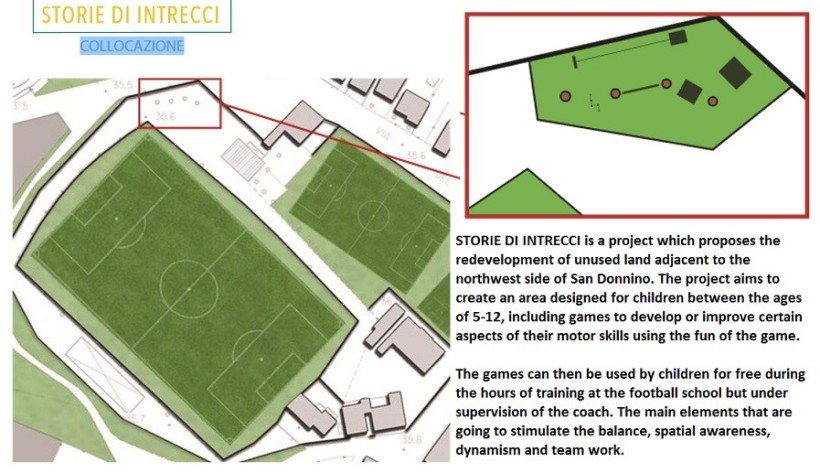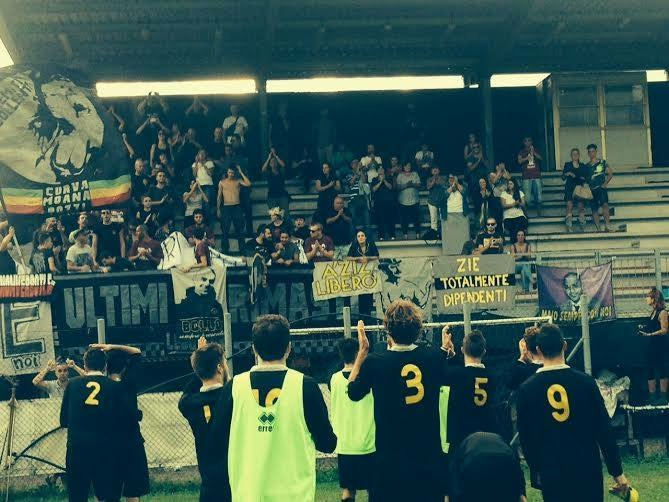Locked away among the pedestrianised streets in the San Frediano district of Florence lies an open green space where local children play football. This in itself is not an unusual sight, but leading the games are the Ultras of C.S. Lebowski, the local team owned by those same supporters.
“We had the crazy idea to come back to our childhood playground,” says club President Lorenzo Giudici. “Many of the Lebowski team learned to play football here.” May 7th marked the opening of their School of Football, close to Piazza Santo Spirito in the heart of the City. It is a long way from San Donnino – where their struggle to retain their stadium has sadly hit a major stumbling block – but such adversity has not dampened their enthusiasm.
After their previous appearance here in the Guardian saw them obtain 500 members across four different continents, it seemed like Lebowski had considerable force behind their campaign before a decision which had been scheduled for February. Procrastination by the local authorities on that ruling has meant that the team have only just found out that they will lose their home at San Donnino, despite their strong campaign to remain at the ground.
Changing the criteria at the eleventh hour to bid for the stadium, officials from the Campo Bisenzio municipality have now decided that only rugby teams will be included in the public tender for the stadium, immediately ruling C.S Lebowski out. They now aim to fight this decision, but feel disillusioned with a system that appears to constantly stack the odds against them.
Despite fighting these obstacles, this determined group have not become complacent and work on the next phase of their ambitious plan is already underway. “Without the participation of local people, it is impossible for a football project to have economic sustainability,” Lorenzo continues. “Our mandate is to strengthen the bond with the community.” Lebowski see the unveiling of a school of football as a way to make contact not only with children but with parents, grandparents and teachers, and to cement their role in the area.
Making tentative moves to bring their new idea into effect, members of the club held talks within the community, ensuring clarity in explaining that the children would remain able to play football in the park free of charge, whilst being coached by members of the Lebowski team.
True to form, their coaching methods are intertwined with their philosophy as a whole. Using principles pioneered by Horst Wein and taught at La Masia – Barcelona’s famous youth academy – children play a mini game of football named “funino” which encourages active participation and independent thinking to develop technique.
“There isn’t a Mister, there isn’t a Coach. The game is the teacher,” members of Lebowski reveal. “Our purpose is not to create champions. We use football to teach life skills.” Scoring and conceding many goals during their training, the children have little time to focus on winning or losing. It is the process of problem solving that aids their development both in and away from football.
The ultimate target is to slowly prepare the children for eventual progression to the first team, but like all of this club’s principles, the fundamental aim is for training to be inclusive and available for all. “We measure results in the long term,” Lebowski member Andrea Sorrentino continues to explain. “The important things are the growth of a young child towards adulthood, the happiness of the child and the sense of belonging between the players, the team and our project.”
The image below is from a project put together by ISIA, a university design institute in Florence who have created a concept for an innovative space suitable for children’s physical education. For Lebowski, this is one of the proudest symbols of their work so far, a manifestation of the concept of “building a bridge between the stadium and the city.”

This project will further their aim to teach children to think for themselves, avoiding a situation whereby the Coach controls the actions of the players. “We think that football is not only a technical and tactical game. It is an emotional one,” the President said. “To play in front of the Ultras and build a good relationship with them is part of this sense of belonging, and will make happy and good players”
The power of this passionate support provided by those Ultras is not to be underestimated. At a recent first team fixture away at Cambiano, local police intervened when 100 Lebowski fans turned up, letting off flares and vociferously supporting their cause. When it appeared that they would be stopped from entering the stadium, Cambiano’s owner appealed for the decision to be overturned, as like so many clubs in the region, they have come to rely on the associated substantial gate receipts.
“People identify with us because everyone is under attack from modern football” Lorenzo continued, giving the recent Guardian article on the effects of West Ham’s move to the Olympic Stadium on the local area as an example. This club feel that universal resistance can be used by everyone. When formed in 2010, Lebowski had a unique set up as a fan-owned operation. Now there are 35 clubs across the peninsula who all follow their example and many approach the Tuscan-based team for advice.
Next on the agenda are more community events including a street party that encompasses all the local schools in the district of San Donnino and a continuation of their School of Football in San Frediano. A fresh campaign for membership will be launched later in the summer, although it is reiterated that this is not an attempt to become a global brand, rather to increase awareness and support for their cause internationally. The club stand firm on their stance that their merchandise will only ever be sold locally, despite numerous requests to the contrary from their rapidly expanding group of admirers.
Never content to stand still, C.S Lebowski see every situation as an opportunity. No matter what the outcome of their bid to continue playing at their stadium, this unique community-based project will continue, making noise and letting off flares along the way.
With thanks to Andrea Sorrentino and Lorenzo Giudici.

